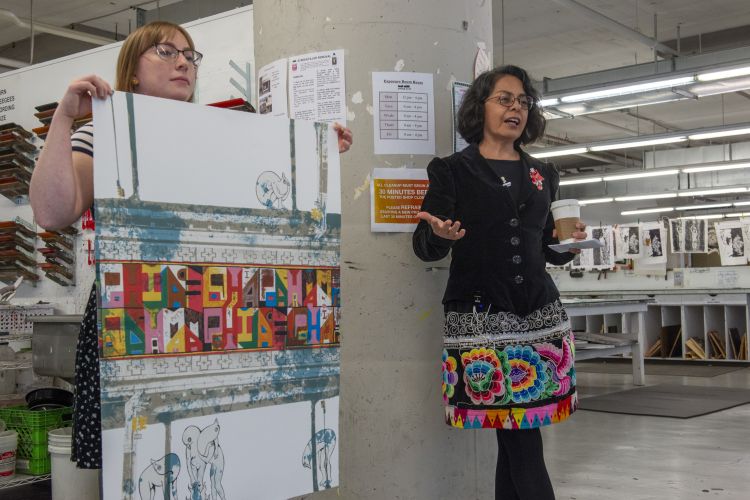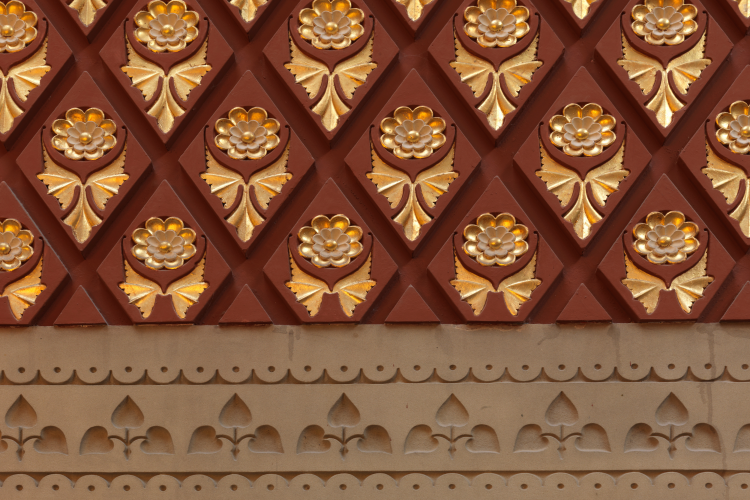STORIES FROM PAFA
Katherine Volpe
Katherine Volpe (MFA '18) carries the experiences of her childhood with her every day.
“I've wanted to be an artist for my entire life and I’ve loved painting for as long as I can remember,” she said. “The other day my mom sent me a picture of me when I was four vigorously drawing with both hands.”
Then everything changed on September 11th, 2001.
“My father, he was a first responder and is a survivor of 9/11. Since I was 7 when it happened, I was so young and everything was hidden from me. Nothing was ever spoken about,” she said. “It was all very shielded but I picked up a lot of what was going on through my parent’s reactions and being around them as a child. I knew there was a lot of pain at that time but I didn’t know why. That’s something that has stuck with me my entire life.”
Twenty plus years later she’s still drawing and painting with as much passion as when she was a young child. The work she makes draws from times she can barely remember but still feels.
During her undergraduate studies at Adelphi University on Long Island, New York, Volpe began painting cityscapes of the New York City skyline. She quietly reflected on the missing Twin Towers that had shaped so much of her life.
“I first started to make cityscape paintings as a way to commemorate the city, it was a weird way of approaching 9/11 and not talking about it. I didn’t tell anyone I was thinking about the Twin Towers,” Volpe said. “When I came to PAFA I thought, ‘I’m just a cityscape painter. It has nothing to do with anything personal, I’m not going to open up that.’ It was too vulnerable.”
But she had enrolled at PAFA to challenge herself, diving into the MFA program right after graduating with her BFA in Studio Art. Volpe expected to be the youngest in her class but knew she needed to be pushed to work very hard.
“I was on such a kick of being young enough to experiment and willing to listen to all of the criticisms with an open mind,” she said. “I wanted to be in a place where I could let my art transform and flourish.”
She began her first semester at PAFA expecting to paint the Philadelphia skyline and continue her career as cityscape artist. But when she set up her canvas in the 8th-floor lobby of the Hamilton building and looked out onto the Philadelphia skyline she didn’t feel a connection.
Going into her second semester of the MFA program, Volpe looked within herself and the buildings she always thought about but didn’t dare paint.
“I started looking up the blueprints for the Twin Towers and that led me to my first idea, I used oil paint to match the old blueprint and redrafting every line of the blueprint. I felt like I was memorializing the hand of the architect that created it,” she said. “You don’t think of the architect who created this thinking that this drawing would outlast the buildings because you think that paper would get destroyed faster than steel.”
As Volpe dove deeper into more personal work, she says faculty, critics, and her fellow students were there to support her every step of the way.
“I really have to commend the faculty for critiquing it in a way of not critiquing the idea but critiquing how I could make the work better,” she said. “How I could switch certain things to make it more relative to my story, that was the help I needed at the beginning.”
In her time at PAFA, Volpe has shown at several galleries in Philadelphia and participated in an exhibition in the Alumni Gallery. Responders featured winners of the 10th annual Fourth Wall Competition. The competition is a mock version of the usually private juried-selection process. It’s designed to shed light on the review process employed within the contemporary art world. The panelists often include a curator, artist, and author to bring in several different viewpoints.
“Coming from a liberal arts undergraduate experience it was weird to come here and have everyone be equally as serious as me. I knew I had to make my work as best as I could. Everyone is really good, everyone is at the top of their game and they all filtered out to come here.”
This summer Volpe and several of her classmates are part of an exhibition at 1969 Gallery in New York. Map is a collaboration between PAFA MFA Chair Didier William and Josephine Halvorson, Chair of the MFA Program at Boston University.
Looking ahead, Volpe plans to explore what coping after tragedy looks like
“The idea of trauma is something I’m definitely going to continue on with for a long time,” she said. “All of the critics have told me I could do this for the rest of my life.”
As for the man who has inspired so much of her work, Volpe said her father worries about her carrying too much pain in her paintings but is proud his daughter is doing this work.
“It’s sort of like a visual way to understand what he’s feeling. I think it’s good that he sees me creating work about this and spreading his story. You don’t hear about the stories of people who are “okay,”” Volpe said. “For a time he talked about how he felt like he shouldn’t be alive because why did his friend have to die and he’s still here. For me that was really hard to hear because he’s my dad, he’s a hero.”





